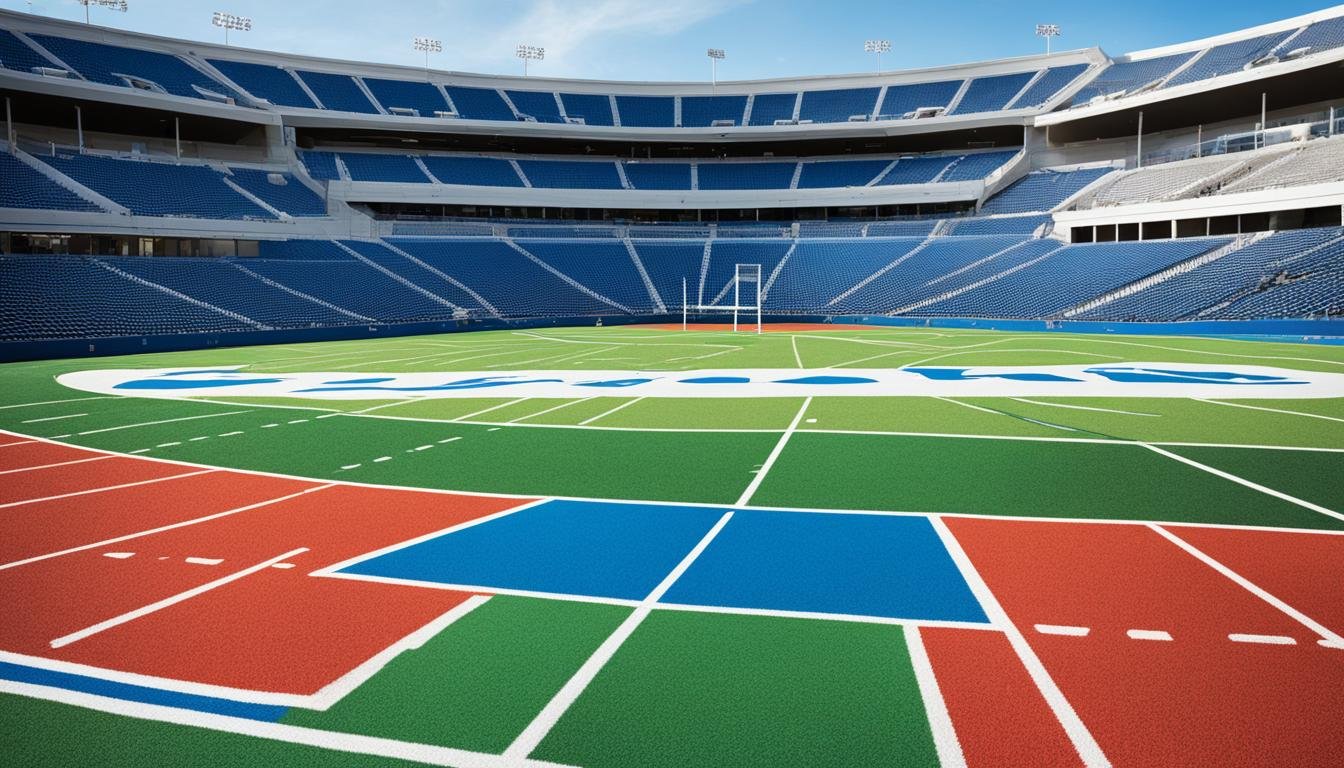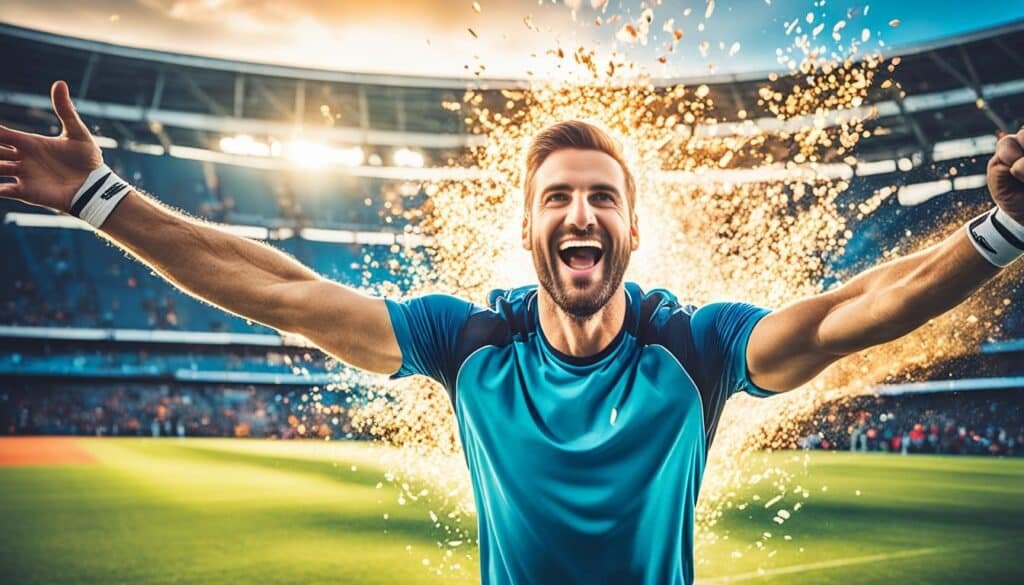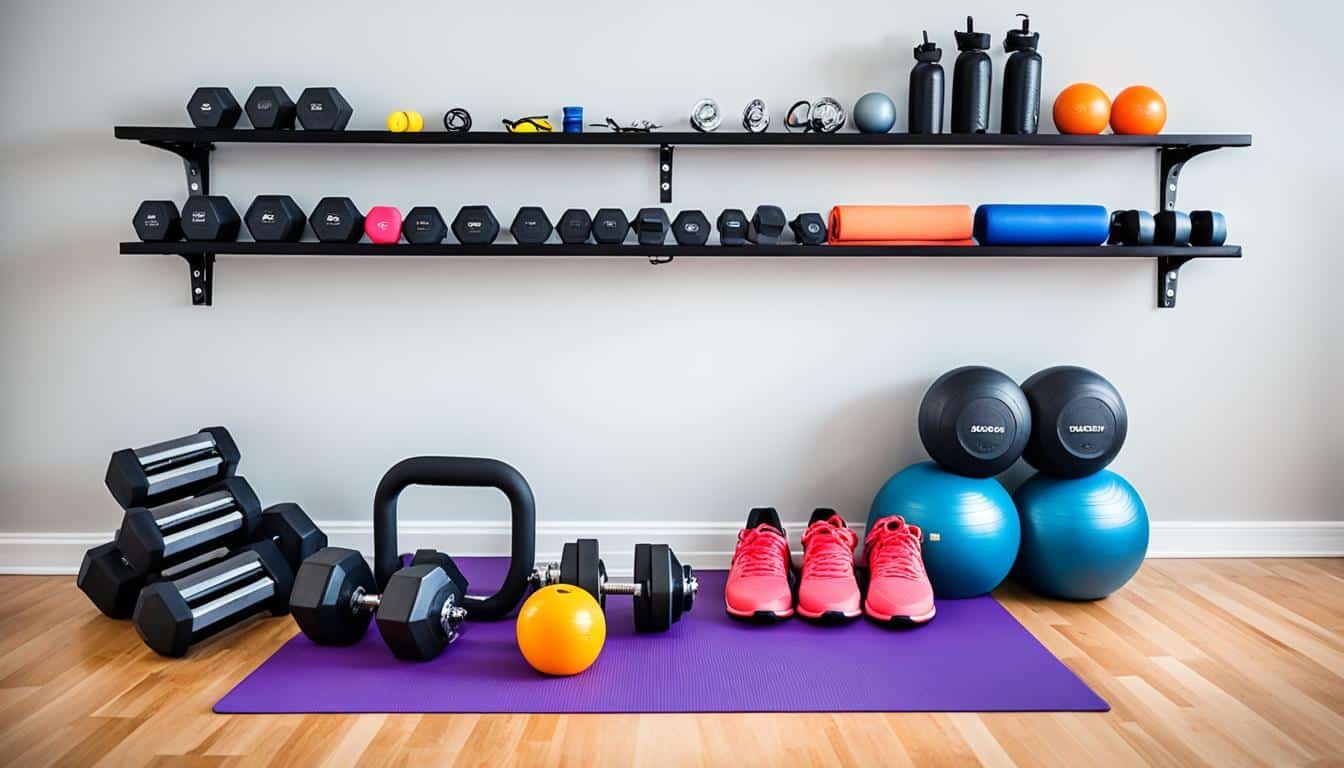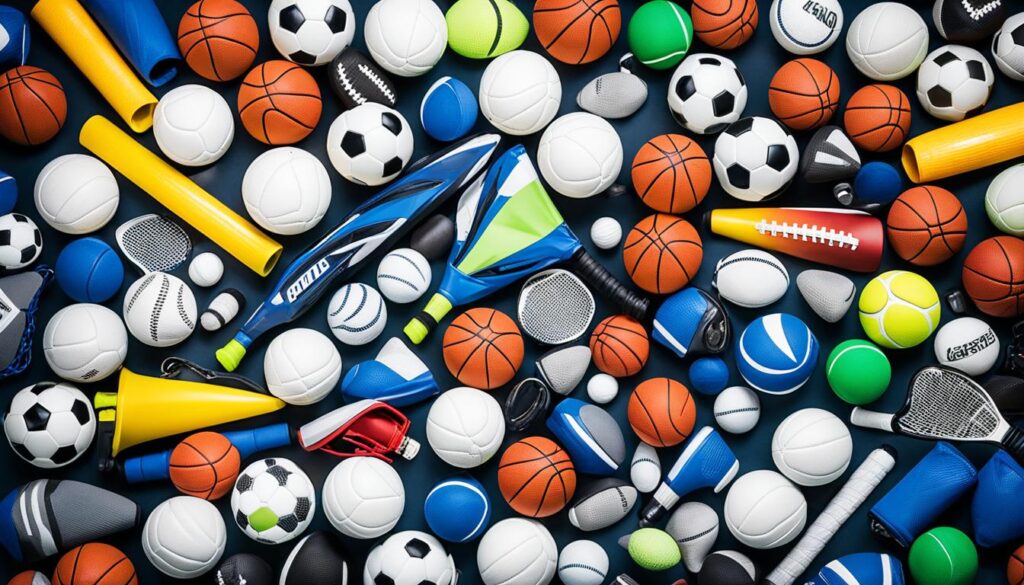Engaging in sports and physical activities is key for our fitness. Team games like basketball and soccer, and solo interests like swimming and running, help us stay active. They make our bodies stronger and boost our health in different ways.
Key Takeaways
- Regular physical activity through sports and other leisure pursuits promotes growth, development, and overall physical fitness.
- Sports activities help reduce the risk of chronic conditions like heart disease, diabetes, and obesity by improving cardiovascular health, muscle and bone strength, and flexibility.
- Engaging in sports can enhance mental health by alleviating anxiety and depression, while also boosting mood and well-being.
- Participation in sports activities can improve psychosocial outcomes, such as self-concept, social behaviors, and self-efficacy.
- Early and ongoing opportunities for physical activity are crucial to maximize the health benefits of sports and other leisure pursuits.
Introduction to Sports Activities and Physical Fitness
Joining in various sports activities can really boost your physical fitness and health. You get the excitement of team games like hockey and rugby. Also, the beauty of doing things solo like gymnastics and biking.
Being active in sports helps you grow and mature. It’s good for both your body and mind. You can enjoy different recreational pastimes. These range from competitive events to leisure activities, all enhancing your physical fitness and healthy competition.
When we look at how sports activities affect physical fitness, we see many benefits. These include a lower chance of getting sick and feeling better mentally. This study will show how important sports are for health and happiness. It also helps us make smart choices about what we do to stay fit.
| Sports Activity | Physical Benefits | Psychosocial Benefits |
|---|---|---|
| Hockey | Improved cardiovascular fitness, muscular strength, and flexibility | Teamwork, communication skills, and emotional regulation |
| Gymnastics | Enhanced body control, coordination, and core strength | Discipline, focus, and self-confidence |
| Biking | Increased cardiovascular endurance and lower-body muscle tone | Stress relief, mental clarity, and connection to nature |
Looking at a wide range of athletic pursuits helps us understand sports’ amazing power. They really improve our health and well-being.
“The way a team plays as a whole determines its success. You may have the greatest bunch of individual stars in the world, but if they don’t play together, the club won’t be worth a dime.”
– Babe Ruth, legendary baseball player
Developmental Stages and Sports Activities

Designing sports activities for kids and teens is key. It’s all about how the body changes from birth through teenage years. This involves motor skills, body size, and what the body can do.
Growth, Development, and Maturation
Everyone grows at their own pace but follows similar stages. Infants quickly learn to move their bodies, then start using their arms and legs. As kids get older, they get better at more complicated activities.
It’s important to match sports with a child’s age. This helps kids and teens enjoy sports and stay healthy. Knowing how their bodies change means we can pick the right activities that help them get stronger and better at moving.
- Infancy: Quick progress with simple movements and motor skills at first.
- Early Childhood: Building on early movements, they improve balance and coordination.
- Middle Childhood: They get better at complex skills and can enjoy more types of sports.
- Adolescence: Big changes mean sports need to adapt to support their growth and new abilities.
Understanding how the brain and body develop is crucial. This knowledge helps pros make activities that fit each stage of a person’s life. They work to boost growth, skill development, and overall health.
Physical Health Benefits of Sports Activities
Taking part in sports often has many physical health advantages. Adults who stay active tend to get sick less. They have fewer heart problems, diabetes, and some cancers. Sports also make our bodies stronger in different ways. Running and swimming help our hearts get stronger. Things like basketball make our bones tougher. This means less chance of breaking bones or getting weak as we get older.
The good habits we learn when young are very important. Starting sports when you’re young sets you up for a healthy life. It keeps you in good shape and away from sickness as an adult too.
“Regular physical activity is one of the most important things you can do for your health. It can help control your weight, reduce your risk of chronic diseases, and improve your mental health and mood.”
Being fit means more than just not getting sick. Sports make our hearts and muscles strong. They also keep our bones from getting weak. This helps us feel and look good at any age.
Sports Activities and Psychosocial Health

Taking part in sports has a big effect on how we feel and interact with others. Studies show it makes us happier and better at talking to people. It also helps us see ourselves in a positive way and act kindly towards others.
Improved Mental Health and Social Skills
Sports are great at fighting off feelings like worry and sadness. The activity, making friends, and feeling proud of what we do can cheer us up. It boosts our belief in ourselves, encourages us to set goals, and helps us get along with others, making us more likely to keep playing sports.
Doing sports also makes us better at working with others and talking. Learning to play together and communicate helps us form strong friendships and feel comfortable in social groups. It also teaches us to believe in ourselves, understand others’ feelings, and work towards common aims, all key for our mental well-being.
“Regular participation in sports activities has been linked to improved mental health, decreased symptoms of anxiety and depression, and enhanced overall well-being.”
There’s plenty of proof that being active in sports boosts our mental and social health. By focusing on both of these, sports help us lead healthier and happier lives. They are a key way to enhance our general health and happiness.
Sports Activities and Cognitive Health

New research shows a strong link between sports, being fit, and thinking well. Many studies prove that being active helps our brain work better. It helps with focusing, remembering, and doing well in school. Just one good workout can improve how we think. When our heart rate goes up from exercise, our brain seems to focus better. That’s why it’s important to move and take breaks during the day. This helps us pay more attention in class.
Being active and playing sports doesn’t just help now. It also makes our brain and school work better over time. Kids who are active remember more, think faster, and do better in all school subjects. Being fit means we do well in school too. We’re still learning how sports and fitness help our brain. But, it seems they might release things that help our brain cells work together better. Also, playing sports is good for our feelings, our friends, and our brain. All these things together make us smarter and do better in school.
As we learn more, we see how vital it is to play sports and stay active. It’s good for our body and our brain. Doing different sports and being active can help us be healthier and smarter.
| Cognitive Function | Impact of Sports Activities |
|---|---|
| Attention | Improved focus and concentration |
| Memory | Enhanced recall and information processing |
| Executive Function | Strengthened decision-making and problem-solving skills |
| Academic Performance | Higher scores in subjects like mathematics and reading |
“Regular physical activity has been shown to have a positive impact on cognitive function and academic achievement in children. The benefits extend beyond just physical health, and can contribute to overall brain development and academic success.”
Sports Activities and Academic Performance
The link between sports, fitness, and school results is of big interest lately. Both studies and practice show a clear benefit of sports on grades, especially in math and reading.
One important way sports help in school is by boosting our brain functions. Things like paying attention, remembering, and solving problems better, known as executive function, get stronger with sports. Many research pieces show that staying active improves these key skills.
Improved Mathematics and Reading
Doing sports can make you do better in math and reading, says the data. A long study by the American Academy of Pediatrics found that kids who were active scored better in math and reading tests. This is likely because sports help with focusing and processing info, which are big for doing well in school.
Having breaks for physical activity and mixing moving lessons with sitting ones helps more. It keeps students more focused and working longer, aiding their school results. Including sports and movement in lessons is smart because it uses the benefits of exercise to improve learning.
| Outcome | Impact of Sports Activities |
|---|---|
| Mathematics Performance | Positive association with improved scores |
| Reading Comprehension | Positive association with higher scores |
| Executive Function | Enhanced cognitive abilities like attention, memory, and problem-solving |
True, many things affect school success. But, sports play a big role in helping students’ minds grow and learn better. By pushing sports and staying active in school and at home, we can really boost kids’ school achievements.
Variety in Sports Activities
It’s really important to mix up sports for kids. This means they should do different kinds of team sports, individual sports, aerobic and resistance exercise. They should also play both in structured games and just for fun. This mix helps kids in many ways.
Playing team sports like soccer or volleyball helps kids with social skills. They also learn how to work together and communicate well. On the other hand, individual sports such as swimming or track and field teach kids about being disciplined and achieving goals.
Doing aerobic exercise, like running or dancing, is great for the heart and making kids stronger. Resistance exercise, which is about building muscle, helps with strength and being flexible. Both types of activities are key for kids’ health and their long-term growth.
Don’t forget about just playing for fun. This type of unstructured play is essential for kids. It could be informal games or things they do on their own. This kind of play lets kids be creative, solve problems, and work with others without a strict plan.
When kids have a lot of sports to choose from, they get all kinds of benefits. They stay healthy not just physically but also in their minds and how they get along with others. This wide range of activities helps kids grow well, both now and in the future.
| Type of Activity | Health Benefits |
|---|---|
| Team Sports | Improved social skills, teamwork, and communication |
| Individual Sports | Increased self-discipline, focus, and personal achievement |
| Aerobic Exercise | Enhanced cardiovascular health and endurance |
| Resistance Exercise | Stronger muscular strength and flexibility |
| Structured Activities | Skill development and goal-oriented progress |
| Unstructured Play | Improved creativity, problem-solving, and social interaction |
“Providing a diverse range of sports activities is crucial for children’s overall health and development. By offering a balanced regimen, we can ensure they experience the full spectrum of physical, mental, and social benefits.”
Sports Activities for All Ages and Abilities
It’s vital to have sports for everyone, regardless of age or ability. Children grow and mature at different rates, affecting their skills. Sports activities should reflect this, helping all children join in successfully.
Adaptive Sports and Inclusive Activities
We must provide sports that fit various physical abilities too. Different sports are available, ensuring all kids can enjoy the physical, mental, and social rewards of playing.
- Adaptive sports, like wheelchair Basketball, help those with physical disabilities take part in competitions and fun games.
- Inclusive activities, such as mixed sports teams, help everyone feel they belong. They bring people with and without disabilities together, encouraging friendships.
- These inclusive and adaptive programs help with motor skills and overall physical development for all involved.
Making sure there are sports for all ages and sports for all abilities helps everyone grow and stay healthy. It doesn’t matter what stage they’re at, sports can support and celebrate their progress.
“Inclusive sports programs not only improve physical fitness but also foster social skills, self-confidence, and a sense of belonging for individuals with diverse abilities.”
By supporting adaptive sports and including everyone, we make sports more open and enjoyable for people of all ages and abilities.
Also Read: Top Benefits Of Playing Sports for Wellness and Fun
Conclusion
This article shows just how much sports can boost our health. By playing various sports, we cut down on illness risks and get in better shape. It also makes us mentally strong, improves how we work with others, and boosts brainpower.
It’s key to match sports with kids’ ages for maximum benefit. All kids, no matter their age or ability, should have sports they can enjoy. Having many sport options helps kids grow well and stay healthy.
Sports help not only in physical health but also in how we think and feel. This article proves that being active can change our lives. Everyone should have a chance to play sports, for a healthier and happier world.
FAQs
Q: How can different sports activities impact physical fitness?
A: Engaging in various sports activities such as martial arts, badminton, rock climbing, or outdoor sports can improve cardiovascular health, strength, agility, and flexibility, leading to enhanced physical fitness levels.
Q: What are some popular sports activities suitable for kids?
A: Kids can benefit from participating in activities like martial arts, preschool sports programs, tag games, or outdoor sports like soccer or basketball, which help in developing physical skills, teamwork, and a love for staying active.
Q: Which sports are considered the best for promoting physical activity for children?
A: Sports like badminton, martial arts, combat sports, and team sports such as soccer or basketball are excellent choices for encouraging regular physical activity and overall fitness in children.
Q: Is it important for preschoolers to engage in sports and activities?
A: Yes, introducing preschoolers to sports and physical activities not only helps in motor skill development but also instills a love for movement and physical fitness from a young age.
Q: What are some examples of enjoyable indoor sports for adults?
A: Adults can enjoy indoor sports like rock climbing, judo, badminton, or ice skating as fun ways to stay active, improve coordination, and enhance physical fitness levels.
Q: How can sports activities help in team building and recreational pursuits?
A: Engaging in recreational sports, team sports like rowing or bowling, or participating in local sports leagues can foster teamwork, communication skills, and provide opportunities for socializing while staying physically active.
Q: How do I get my kids involved with sports and physical activities?
A: You can get kids moving by enrolling them in summer camps, sports registration programs, local gym classes, or introducing them to fun activities like racket sports, tag games, or toddler-friendly games and activities to make staying active enjoyable for them.
